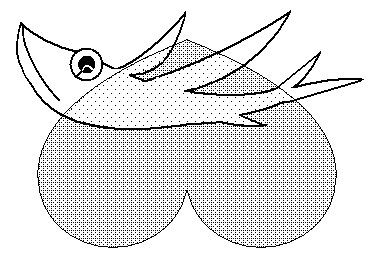Happy New Year! I'm sorry for skipping this series for several months last year, due to healing my crazy vision and preparing to move our living base. These are still in progress, but I made this page for the beginning of 2010. After months, I realized that I forgot many things about how to use the computer and names of image-files; but not about basic Earth Language! ...hoo
For this time, I chose one
of Dhugal J. Lindsay's haiku from First Australian
Haiku Anthology edited by John Bird.
The author wrote originally in Japanese in alphabet and English. I was impressed
by his fresh and clean viewpoint even with his classical Japanese haiku style;
and wondered what kind of person he was. I was satisfied by knowing that he was born in Rockhampton, Queensland, in 1971; and is currently working at
Japan Agency for Marine-Earth Science and Technology in Yokosuka, Japan, using
submersibles to research the ecology and behaviors of deep sea organisms. He began writing
haiku in Japanese in 1991 and is active in several haiku
groups in Japan.
About this haiku, flying fish:
In the place I had lived near the Sea of Japan, they called this fish Ago. A
kind of sausage made of it couldn't be omitted from New Year's cuisine there. I
was fascinated by schools of the flying fish on a boat. A fish shop there often
had lively Ago like the one in this haiku.
Reminding me such scenes, this haiku simply sketches a dead condition of a fish,
but actually asks a question about the reader's lifestyle in the present time, I
felt.
"Will I (![]() ) be
spreading my wings, when I go out of my life (
) be
spreading my wings, when I go out of my life (![]() )?"
)?"
Since everybody is born, everybody will die sometime.
I'll do my best to live stretching out my wings from my body this year.
To the haiku
新年おめでとうございます。昨年は視力挽回と引越し準備のために長らく休刊してごめんなさい。まだどちらも途上ですが、新年にあたって久しぶりにこのコーナーを開きます。数ヶ月のブランクでソフトウェアの使い方やイメジ・ファイルネームを忘れててこずりましたが、地球語の基礎は忘れてませんでした! ...hoo
John Birdさん編集のオーストラリアの俳句サイトからDhugal J Lindsayさんの俳句を訳します。
日米両語で書かれていて、ローマ字の日本語が古風なのに視点はどれも新鮮で、作者はどんな人かと興味を持ちました。1971年Queenslandのお生まれで、現在は横須賀の海洋研究開発機構で深海生物を探求中と後で知り、なるほど!
飛魚の1句:私が暮らした出雲地方では、飛魚はアゴと呼ばれ、お正月料理にも欠かせない野焼きかまぼこの材料でした。隠岐に渡ったとき、翼をピンと張って飛魚が群れ飛ぶのに見とれたました。出雲地方の魚屋さんには、この句のようなアゴがよく並びました。
この句は、そんな光景を思い出させながら、やがて私(![]() )に疑問符をつきつけます。
)に疑問符をつきつけます。
「私は命(![]() )の外の死の世界に帰るときもこんなふうに翼を広げているだろうか?」
)の外の死の世界に帰るときもこんなふうに翼を広げているだろうか?」
生まれたからには誰もいつか死を迎えます。この句は死の状態を詠みながら、
今の私たちの生き様を問うていると感じました。
今年も身体の外に存分に翼を張って生きることにしましょう。
(記号は、文字絵の中に使われています)
 The original Japanese haiku by
The original Japanese haiku by 
 verb
mark,
verb
mark,  condition}: be + ..ing or be +
adjective (状態を表す動詞記号)
condition}: be + ..ing or be +
adjective (状態を表す動詞記号) no,
no,
 life}: death, dead (死)
life}: death, dead (死) preposition
mark,
preposition
mark,  nature.
nature. space}
(sky),{
space}
(sky),{ ,(
,(